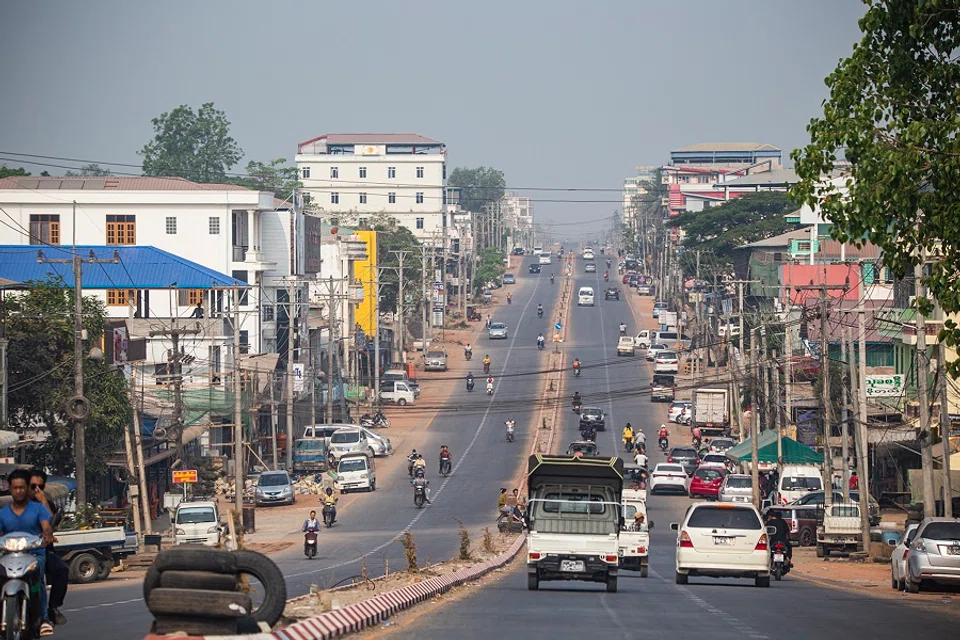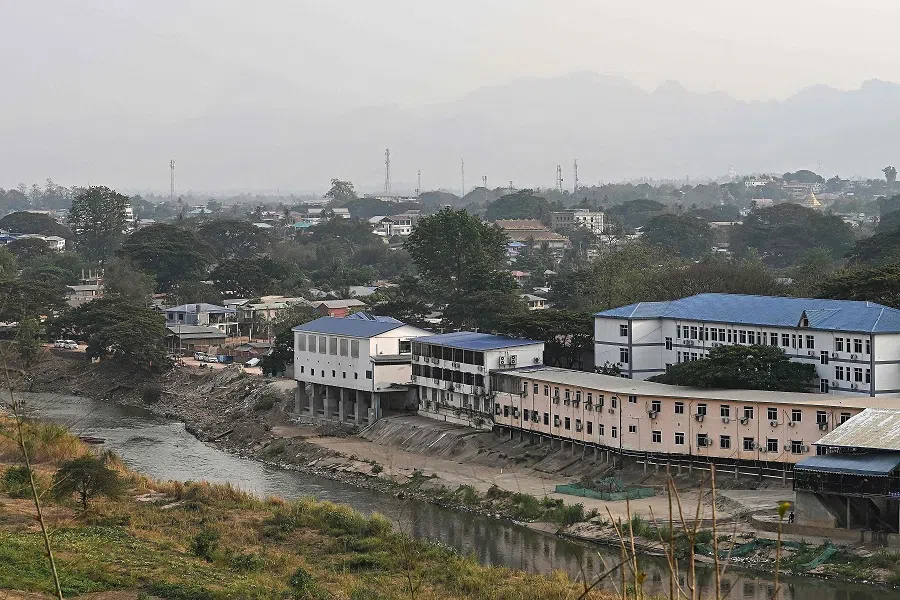Chinese actor’s rescue recasts spotlight on telecom fraud
While Chinese actor Wang Xing survived his ordeal at the Thai-Myanmar border, many other victims of telecom fraud continue to be at risk. The scale of these operations across Southeast Asia makes them hard to root out. Meanwhile, the tourism sector in countries like Thailand may be taking a hit from the negative reports. Lianhe Zaobao correspondent Yu Zeyuan tells us more.

The “movie set scam” in Thailand involving Chinese actor Wang Xing has brought the longstanding issue of telecom fraud back into the spotlight, sparking safety concerns among Chinese people planning to travel to Thailand. Many are puzzled, questioning why incidents like Wang Xing’s case are still happening even though China has achieved significant results in cooperating with Myanmar to combat telecom fraud over the past two years.
On 10 January 2025, Zhang Ming, a spokesperson for the Chinese Ministry of Public Security, told the media that China had launched a special campaign against telecom and internet fraud in northern Myanmar since July 2023. Over 53,000 Chinese nationals involved in fraud have been arrested, and the notorious “four big families” crime syndicate in northern Myanmar’s Kokang region has been dismantled. Furthermore, large-scale scam centres near the China-Myanmar border in northern Myanmar have all been eradicated.
Ongoing proliferation of telecom fraud operations
However, the eradication of scam centres in northern Myanmar does not mean that telecom fraud activities in Myanmar and other areas are crippled; telecom fraud organisers within Myanmar have simply shifted their operations from northern Myanmar to other regions. Wang Xing, for instance, was scammed into a fraud operation in the Myanmar town of Myawaddy, which borders Thailand.
The scale of offshore fraud operations remains vast, as scammers tailor fraud schemes to a wide pool of victims of different ages, professions and educational backgrounds.

Zhang Ming also admitted that the current criminal situation remains severe and complex. Telecom fraud is still a major crime with a high frequency of incidents, large financial losses, serious harm and strong public concern. Fraud groups are well-organised, with some implementing closed management systems and using violent methods to control lower-level personnel illegally in fraud operations.
At the same time, scam leaders and key operatives are involved in other illegal activities, such as app development, traffic promotion and money laundering, while domestic and foreign operations are closely knit. Fraud tactics are evolving rapidly, with scammers keeping up with social trends and personal preferences. The scale of offshore fraud operations remains vast, as scammers tailor fraud schemes to a wide pool of victims of different ages, professions and educational backgrounds. While there has been noticeable progress in combating telecom fraud in northern Myanmar, there are still many so-called “tech parks” and “development zones” abroad that provide venues for telecom fraud.
Some tourism industry professionals have reported over 10% cancellation of air tickets to Thailand.
Will the Chinese government’s response be enough to reassure Chinese tourists?
In response to the rampant fraud, Zhang Ming said Chinese police will intensify efforts in anti-fraud operations and maintain a strong, high-pressure stance in crackdowns. For overseas fraud dens, China will fully engage in international law enforcement cooperation, persistently targeting and dismantling foreign fraud operations and pursuing major fraud fugitives.
Despite Chinese police expressing their determination and achievements in combating offshore telecom fraud, the unease caused by the Wang Xing incident is unlikely to subside in the short term. In a sense, Thailand seems to have become a high-risk tourist destination, with some Chinese tourists starting to reconsider their plans to travel to Thailand and similar places. Some tourism industry professionals have reported over 10% cancellation of air tickets to Thailand.

According to lanjinger.com, many tourists who initially planned independent travel have opted for group tours instead. A travel agency in Shenzhen said: “Indeed, some tourists are now afraid to go because of this incident. We persuaded them to go ahead with their plans, and most ended up going eventually. If they cancelled, they would lose a significant amount of money on flight and hotel fees. It is now peak tourist season in Thailand, and flights and hotels are in short supply. International hotels require full payment upfront after booking, so once the itinerary is arranged, it’s impossible to get a refund.”
... in areas like Myawaddy — which are controlled by local armed factions — China’s influence is limited, making them new hotspots for telecom fraud.
Telecom fraud could impact Chinese tourism in Thailand
To mitigate the impact of the Wang Xing incident, the Tourism Authority of Thailand issued a statement on 11 January 2025 to strengthen the confidence of Chinese tourists travelling to Thailand. The statement emphasised that Thailand would make every effort to provide a high-quality travel experience for Chinese tourists and expressed hope that Chinese visitors would maintain their confidence in travelling to Thailand.
Tourism is a pillar industry for Thailand, which remains a preferred destination for Chinese travellers. According to Thai statistics, over 35 million foreign tourists visited Thailand in 2024, with Chinese tourists making up the largest group at 6.7 million. Thai authorities predict that the number of Chinese tourists visiting Thailand this year could increase to 7 to 8 million.
It is still uncertain how much the Wang Xing incident will impact Chinese tourism to Thailand, but Sino-Thai relations have been good in recent years. If incidents like the Wang Xing case do not recur, Thailand’s appeal to Chinese tourists should eventually recover.
Telecom fraud is not a new issue in China. In recent years, it has become increasingly difficult for fraud operations to survive within China as China intensifies efforts to combat telecom fraud, forcing many of them to relocate to countries like Myanmar and other Southeast Asian nations. Once a hotspot for telecom fraud operations, northern Myanmar has largely been cleaned up due to joint efforts between China and Myanmar. However, in areas like Myawaddy — which are controlled by local armed factions — China’s influence is limited, making them new hotspots for telecom fraud. Some estimates suggest that as many as 100,000 Chinese nationals are still engaged in telecom fraud operations across Myanmar.

Hong Kong’s Ta Kung Pao reported that in Myawaddy, just across the river from Thailand’s Mae Sot, there are dozens of heavily guarded telecom fraud centres of various sizes, surrounded by concrete walls and barbed wire several meters high, with watchtowers in between. The buildings within the centres are luxurious and well-equipped enough to be easily mistaken for a villa complex. New construction projects are also actively underway, creating an atmosphere of “prosperity”.
Chinese telecom operators must strengthen control over “virtual phone numbers” to tackle fraud at the source and reduce the likelihood of telecom fraud.
Impossible for China to completely wipe out telecom fraud in Southeast Asia
Some netizens have complained, questioning why China — despite its current strength — cannot simply wipe out fraud centres in places like Myawaddy, just as it did in northern Myanmar.
It is, of course, unrealistic to expect China to do so. It cannot control armed factions across Myanmar as it does with local militias in northern Myanmar. Even the Myanmar government and military have difficulty controlling the armed groups in Myawaddy. Furthermore, an operation using force to eliminate fraud dens in another country’s territory would involve issues like national sovereignty and territorial integrity, making it unlikely for China to resort to such measures.
China obviously cannot fully eradicate offshore telecom fraud dens right now. What the government can do, in addition to working closely with relevant authorities in other countries to combat fraud, is to continually raise public awareness of fraud prevention. Citizens need to be wary of scam phone calls and avoid believing in “get rich quick” schemes abroad. Moreover, Chinese telecom operators must strengthen control over “virtual phone numbers” to tackle fraud at the source and reduce the likelihood of telecom fraud.
This article was first published in Lianhe Zaobao as “铲不尽的电信诈骗”.



![[Big read] When the Arctic opens, what happens to Singapore?](https://cassette.sphdigital.com.sg/image/thinkchina/da65edebca34645c711c55e83e9877109b3c53847ebb1305573974651df1d13a)

